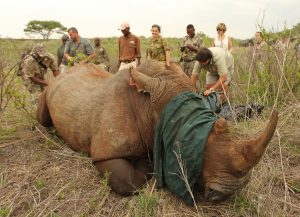 Thanda Safari, the privately owned game reserve situated in South Africa’s KwaZulu Natal province, is inviting guests to join their dedicated Rhino Monitoring Team for a half day’s insight and participation into the daily activities required to protect these magnificent species from poachers.
Thanda Safari, the privately owned game reserve situated in South Africa’s KwaZulu Natal province, is inviting guests to join their dedicated Rhino Monitoring Team for a half day’s insight and participation into the daily activities required to protect these magnificent species from poachers.
As part of the reserve’s mission to serve as a responsible custodian of the environment, Thanda Safari’s Rhino Monitoring Team are tasked with overseeing the surveillance of both the white and black rhino and recording the data daily. Members of this team are not only guardians of these threatened species, but also play an intricate part in contributing towards the reserve’s ecological data.
Departing by vehicle 15-20 minutes before sunrise, a time when these animals are still active, guests will be briefed by a Rhino Monitor and qualified Lead Trails Guide on the challenges around rhino monitoring as they look for tracks. Detailed explanations during the dawn drive will include how to track a rhino and record its ecology, their behavior, feeding patterns and vegetation preferences as well as the ongoing threats faced by the species. Once rhino tracks have been found, the guide will lead guests into the bush on foot. Closed walking shoes, long trousers and neutral-colored clothing must be worn (no white, cream, or bright colors). Identification signs on the rhino will be explained, with guests assisting to classify the rhino based on its ear notches and record its condition. They will also learn to observe wind direction and the activity will continue to be as interactive as possible depending on the tasks of the day and within the predetermined safety perimeters.
Costing R1500 per person for the 3-4 hour activity, the not-for-profit fee is split to cover costs and directly be channeled back into conservation. R500 will go to hospitality to cover drinks and snacks, use of a dedicated vehicle and the guide’s salary, whilst the remaining R1000 will contribute directly towards veterinary bills, fencing, cameras, APU (Anti Poaching Unit) salaries and so forth.
